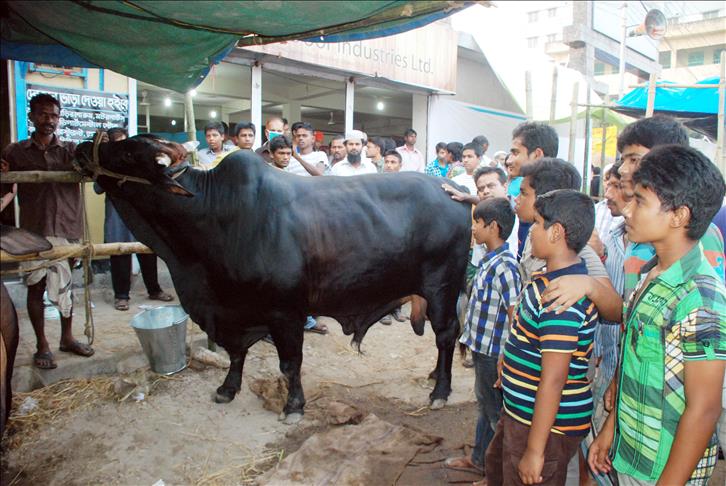
DHAKA
Eid al-Adha, a major Muslim religious festival that marks the climax of the Hajj pilgrimage, is an annual blessing for thousands of permanent and seasonal cattle traders in this South Asian country.
"Cattle trading business is good and profitable during the Eid al-Adha, that's why I have been doing this business every year at this time," Badruddin Badu told the Anadolu Agency at a makeshift cattle market in capital Dhaka.
"I have been in the cattle business the past twelve years during the Eid al-Adha only," he explained.
Badu, 50, brought forty cows from Kushtia, a district in the Khulna administrative division of western Bangladesh some 250km from Dhaka, to sell them in the capital.
"I make good profit from this business every year. I hope I will make good money this Eid, too."
Known locally as Korbani Eid, literally the Festival of the Sacrifice, the selling of cattle and meat booms in the days leading up to Eid al-Adha, which begins this year in Bangladesh on October 16th.
Thousands of permanent and temporary cattle markets are set up in villages, towns and cities countrywide.
"Buying and selling sacrificial animals is my main business every year and is the source of income," Mohammad Khalil, a 45-year-old cattle trader, told the AA.
He brought 18 cows from a northern district to sell them in capital Dhaka.
"I have no land and this is my only business. We wait for this Eid season."
More than two million cattle, mainly cow, buffalo, camel and goat, are sold in the makeshift markets.
A medium-sized cow is usually priced at $500-700 while a big-sized one is sold for $1,000-1,500.
Some extraordinary fatty and huge-sized bulls cost as high as $10,000-12,000.
During last year's Eid al-Adha some 3.5 million cattle were sacrificed, according to the government's Department of Livestock Service's data.
The Bangladesh Finished Leather, Leather Goods and Footwear Exporters Association (BFLLFEA) put the figure at more than 5 million.
It said around 5 million raw hides were collected after Eid.
The sacrificial animal market during the Eid season is estimated at nearly sixty billion Bangladeshi taka (roughly $1 billion).
Muslims who can afford it should sacrifice a sheep or share in sacrificing a cow or a camel in a ritual commemorating Prophet Ibrahim's willingness to obey God's command by sacrificing his son Ismail.
Bangladesh has a population of nearly 160 million and 90 percent of them are Muslims.
Seasonal
The Eid al-Adha is a blessing, particularly to poor cattle sellers and farmers who wait the whole year for this season.
Shahjahan Sheikh, a small cattle farmer from Kushtia, has brought two fattened bulls to the cattle market in Dhaka.
He came along with nine other villagers from his district. The group brought 29 cattle on a truck two days ago.
"I breed cows as a hobby and sell some of them during the Eid season to make good money," Mohammad Harun-ur-Rashid, a teacher, told the AA in a makeshift cattle market.
"I brought three fat, extremely large-seize cows for sale," he added, putting the price tag at about $6,000-10,000.
Mohammad Raju Mandalm, a 24-year-old who has a bachelor degree, also considers cattle selling a seasonal business.
"We have bred some cows for the Eid a-Adha," Mandal told the AA.
"We have another business but since my grandfather and father's time we have been breeding animals only for the Eid season," he explained.
"This is a good business for us and we earn handsome money selling sacrificial animals during the Eid."
Days before Eid, Bangladeshis flock to makeshift cattle markets to buy their sacrificial animals.
"I will buy a cow and sacrifice it to Allah which is the sunnah (practice) of Prophet Ibrahim," Latif-ur-Rahman, a 65-year-old retired teacher, told the AA.
"We sacrifice the animal for the satisfaction of Allah the Almighty," he explained.
Maksuda Begum came to the city cattle market looking for a good sacrificial animal.
"Today, I have seen the prices of the cattle," the 36-year-old woman told the AA.
"I just come here to see the market but my husband will buy the sacrificial animal."
By Ferdous Ahmad Bhuiyan
Anadolu Agency website contains only a portion of the news stories offered to subscribers in the AA News Broadcasting System (HAS), and in summarized form. Please contact us for subscription options.

